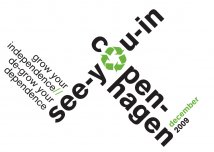This December, the largest ever U.N. conference over the question of climatic change (COP15) will be held. This event is stirring up an incredible amount of attention on a global scale. Formally, the U.N. discussion will be based on a redefinition of CO2 emission quotas, but in reality what is at stake is much more complex.
The meeting scheduled for next December in Copenhagen is not going to be the usual summit held by the powerful, nor is it going to be just a “world conference” under the aegis of the UN. The topic and the moment in which it is organized reveal its far-reaching historical importance which go far beyond its mere formal aspects: a great public space, full of doubts and certainties, real conflicts between opposing interests and insoluble contradictions will put ecological issues – starting from climate change – at the center of the international debate over the economic crisis.
Instead, it will lead to the inevitable acknowledgement that this is the era of precarious life, life understood as bios, completely co-opted within exploitative capitalistic social relations. A bios where natural and artificial elements are mixed, indistinguishable and schematically impossible to separate, but which is the continuously redefined result of the dynamic interaction between man and nature. Today, bios is ontologically precarious, because it is constitutively victim of the many effects of an eco-systemic crisis that questions the fundamental conditions of the reproduction of life in the biosphere and, as such, anticipates and somehow determines the financial and economic crisis.
But the climatic crisis urgently demonstrates that just as the relation between what is natural and what is artificial, it is not possible to separate these two elements that make up our life: natural resources can’t be consumed until there aren’t anymore left in order to have endless immaterial freedom. Nor does it make any sense to talk about the immaterial as something secondary because in reality it is the infinite desire and power of human cooperation open to the freedom of knowledge and sharing.
The indissoluble relation between immaterial goods and natural resources in the contemporary bios and therefore the contradictory coexistence of abundance and scarcity – the real center of the systemic global crisis – tells us that the heart of the problem is the battle over the definition of the commons, over the statute of that which is common. Through private appropriation of scarce primary resources and their unlimited consumption, capital has imposed developmental and industrial pillage on the planet and, through the standardization of “excessive liberty” of the digital, also wants to impose rarefaction and control over free communication and knowledge sharing.
In the struggle against those who continue to exercise full control over what exists and what is produced in order to profit, there is also another element: both in the struggle to stop ecosystemic destruction and in the struggle to defend digital liberty, the idea of “property” – both public and private – is being put into crisis. There is the affirmation of a new paradigm of the common, produced by multifaceted living relations, where scarcity and abundance, natural and artificial, territory and social subjects exchange for the benefit of all. The contemporary struggle for the commons is closely tied to the affirmation of independence. It could be more precisely defined in terms of “reducing dependance” and “increasing independence” in every intertwined aspect regarding life.
This is why the ecologic crisis is not a consequence of the economic crisis, but at the center of it; it is what determines the financial crisis and its social repercussions, not what follows it. We find this new bios in it, genetically mutated by exploitation that has co-opted life itself.
It is also the end of old paradigms, tied to the idea of unlimited development founded on “what is scarce” (limited and unrenewable natural resources) and can no longer be indefinitely privatized (common goods). The effects of the ecological crisis will force capitalists to create a new development model based on “what is abundant” (immaterial goods). However, since these goods are produced by social cooperation, this strengthens the possibility to organize our independence and forces us to truly understand independence as the new dimension of struggle to change the world.
We’ll be in Copenhagen because our nature, common and destinies are precarious, just as our means, but the multitudes together can create invincible hope.
We’ll be in Copenhagen to actively participate in the COP15 Conference, together with others, to live the mobilizations organized by international activist networks and collective realities.

